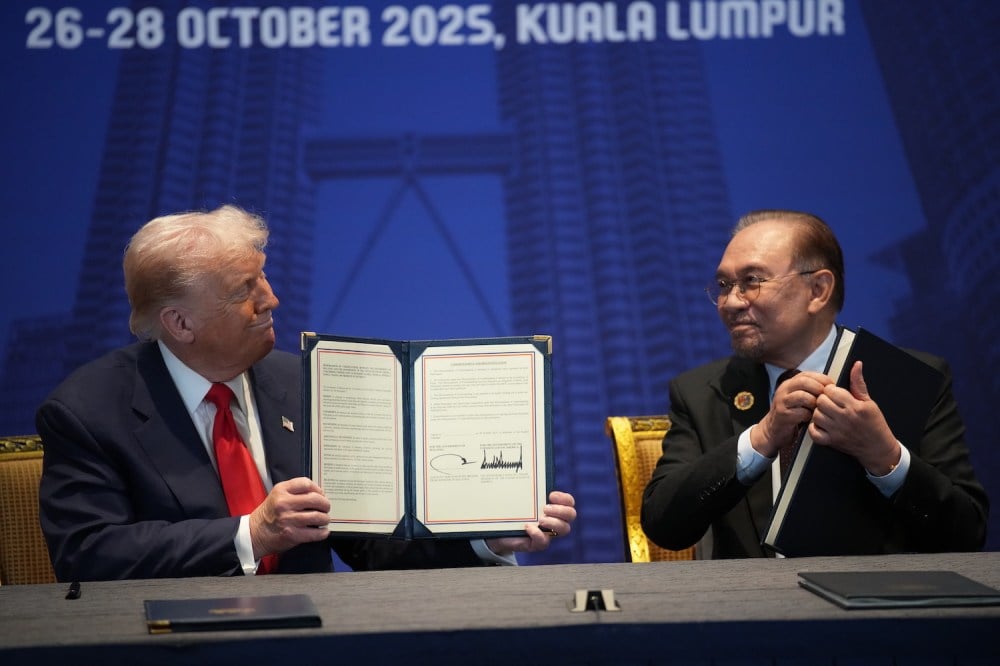As China flexes its rare-earth muscle in trade talks, U.S. President Donald Trump has been waging an all-out effort to ramp up domestic critical mineral production and secure new partnerships abroad.
That campaign has kicked into high gear in recent weeks as the Trump administration has chased minerals in its diplomacy in the Asia-Pacific, striking a raft of deals in just this past month with Australia, Malaysia, Thailand, and Japan. At home, the U.S. leader has also embraced a more unorthodox—and hands-on—approach to resuscitating a domestic mining industry as his administration increasingly takes equity stakes in private companies.
“The acceleration of efforts to counter China has been at breakneck speed,” said Gracelin Baskaran, director of the Critical Minerals Security Program at the Center for Strategic and International Studies, a Washington, D.C.-based think tank.
Few issues have imbued the second Trump administration’s agenda quite like critical minerals—a group of around 50 mineral commodities that the U.S. Geological Survey has deemed critical to U.S. national and economic security. Among those commodities are the not-so-rare rare earths, which are 17 metallic elements that underpin everything from F-35 fighter jets to wind turbines.
China maintains a powerful grip on global supply chains for rare earths, commanding around 85 percent of rare-earth processing and 92 percent of magnet production—giving it key leverage in negotiations with Washington.
Those tensions came to a head this week when Trump and Chinese leader Xi Jinping met for rare talks in Busan, South Korea, resulting in a temporary truce that will see both countries dial back some of their harshest measures in the immediate future.
China agreed to walk back some of its most expansive rare-earth export controls, which were issued three weeks ago but had yet to take effect. But Beijing’s earlier export controls—including restrictions targeting gallium and germanium, two crucial semiconductor inputs, as well as a sweeping licensing system—appear to remain in place, ensuring that the country still has a powerful card to play in future trade talks.
“The Chinese have an enormous amount of leverage over the United States, certainly with the magnets,” said Chris Berry, the president of House Mountain Partners, an independent metals analysis consultancy.
It will likely take at least “five to seven years, under the best of circumstances, to have some sort of a rare-earth magnet supply chain that does not touch China,” he added.
Desperate to slash U.S. dependence on Beijing, the Trump administration has eagerly sought out new mineral deals abroad. From Ukraine to Pakistan, Trump has struck agreements or secured commitments over critical minerals with at least eight countries, many of which have used the deals to curry favor with the U.S. leader.
Yet with many details still unknown, it remains unclear just how effective these agreements will be. “We just won’t know how strong or robust these deals are until we actually start seeing money, capital, deployed,” Berry said.
Domestically, the Trump administration is taking a far more hands-on approach to boosting mining. While the United States was once home to a robust mining industry, that industry was beset by environmental and financial challenges in the 1970s, and U.S. lawmakers came to see the sector as one that should be outsourced to other countries.
To reverse that trend, the Trump administration announced this month that the U.S. government would take a 10 percent stake in Trilogy Metals, a Canadian firm with projects in Alaska. Trilogy is the third mining company that the U.S. government under the Trump administration now owns equity stakes in, alongside Lithium Americas and rare-earth miner MP Materials.
“Equity is arguably the highest level of engagement, and what we’re really seeing is a doubling down of the unprecedented public-private cooperation in minerals,” Baskaran said.
More could come soon. U.S. Treasury Secretary Scott Bessent told CNBC earlier this month that the Trump administration planned to harness price floors and “forward buying” across “a range of industries” to back American companies in strategic sectors.
“When you are facing a nonmarket economy like China, then you have to exercise industrial policy,” he said. “We’re not going to come in and take stakes in nonstrategic industries, but we’ve identified seven industries,” he added later.
For some industry experts, the new strategy resembles Beijing’s.
“You could argue that the United States is becoming more like China in its investment approach, where—for lack of a better phrase—winners are picked and subsidized and pushed forward to achieve some sort of a national goal,” Berry said.
And as Trump’s campaign picks up speed, mining firms across the United States are hoping they’ll be chosen next. Just as other countries are courting Trump with their own mineral deals, a growing number of miners are making pitches to his administration.
Mining companies didn’t use to flock to Washington, said Christopher Ecclestone, a mining strategist at the financial advisory firm Hallgarten & Company. That’s changed.
Now “you’d be battering them off like mosquitoes in the summer,” he said.
The post Will Trump’s Critical Minerals Blitz Pay Off? appeared first on Foreign Policy.




